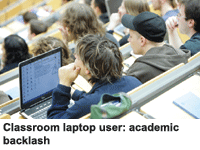 Jeremy Littau, an assistant professor of journalism and communication at Lehigh University, Pennsylvania, recently experienced a revelation. Those who brought laptops with them to class, purportedly for note-taking, seemed to be performing less well than students who did not. And not only were they distracted, so were their nearby classmates.
Jeremy Littau, an assistant professor of journalism and communication at Lehigh University, Pennsylvania, recently experienced a revelation. Those who brought laptops with them to class, purportedly for note-taking, seemed to be performing less well than students who did not. And not only were they distracted, so were their nearby classmates.
“There’s a halo effect, where people are being distracted by what’s on the screen,” says Littau. “The conspiracy theorist in me assumed they were on Facebook.” Some were. Or on Twitter or YouTube or eBay, or all three at the same time. One architecture student turned out to be designing a building while Littau was conducting lectures.
When he started surreptitiously tracking the academic performance of the laptop users, Littau found they were getting lower grades. Now, along with a growing number of other US academics — and backed by new neurological research suggesting that technological distractions are taking a significant toll on learning — he has taken the dramatic step of banning laptops from his class.
A backlash against technology is emerging after universities have spent fortunes wiring their campuses for access to the internet. And it is happening not only in universities but also in technological institutions such as the Massachusetts Institute of Technology (MIT) and elite law schools including those of Harvard University and the University of Chicago.
“Now is the time of repentance,” jokes Sherry Turkle, professor of the social studies of science and technology at MIT, founder of the MIT Initiative on Technology and Self, and a clinical psychologist. “Universities had great technological enthusiasm. But as I’m travelling around now, I’m feeling the backlash,” she says.
Chicago Law School has blocked wireless internet access in some classrooms. At least one Harvard academic — Jonathan Zittrain, ironically a specialist in internet law — has banned laptops and mobile devices from one of his classes. Other universities have variously declared internet-free zones, week-long technology “retreats”, or 15-minute periods a day to disconnect. As a one-week experiment last year, Harrisburg University of Science and Technology, Pennsylvania blocked access over its wireless network to social media sites — not only for students, but also for academics and administrative staff.
Although many tech-savvy students at the institution complain bitterly — some wore T-shirts printed with the words, “We all have smartphones, dumbass” — a quarter of them later reported that they were able to concentrate better in class, found lectures more interesting and spent more time doing homework. Some even said they ate better and exercised more.
All of these experts counsel not switching off the internet altogether, but teaching students how to use it — and, at times, ignore it. “We’ve made it very confusing for our students,” argues Turkle. “We have put the whole course online. We’ve videotaped it so they can stay home and watch it in their rooms. We’ve put everything online so they have a reason to open the laptop. We’ve done this for them thinking it was progress. It confuses them when we now say: ‘Don’t open your laptop’.”
(Excerpted and adapted from Times Higher Education)